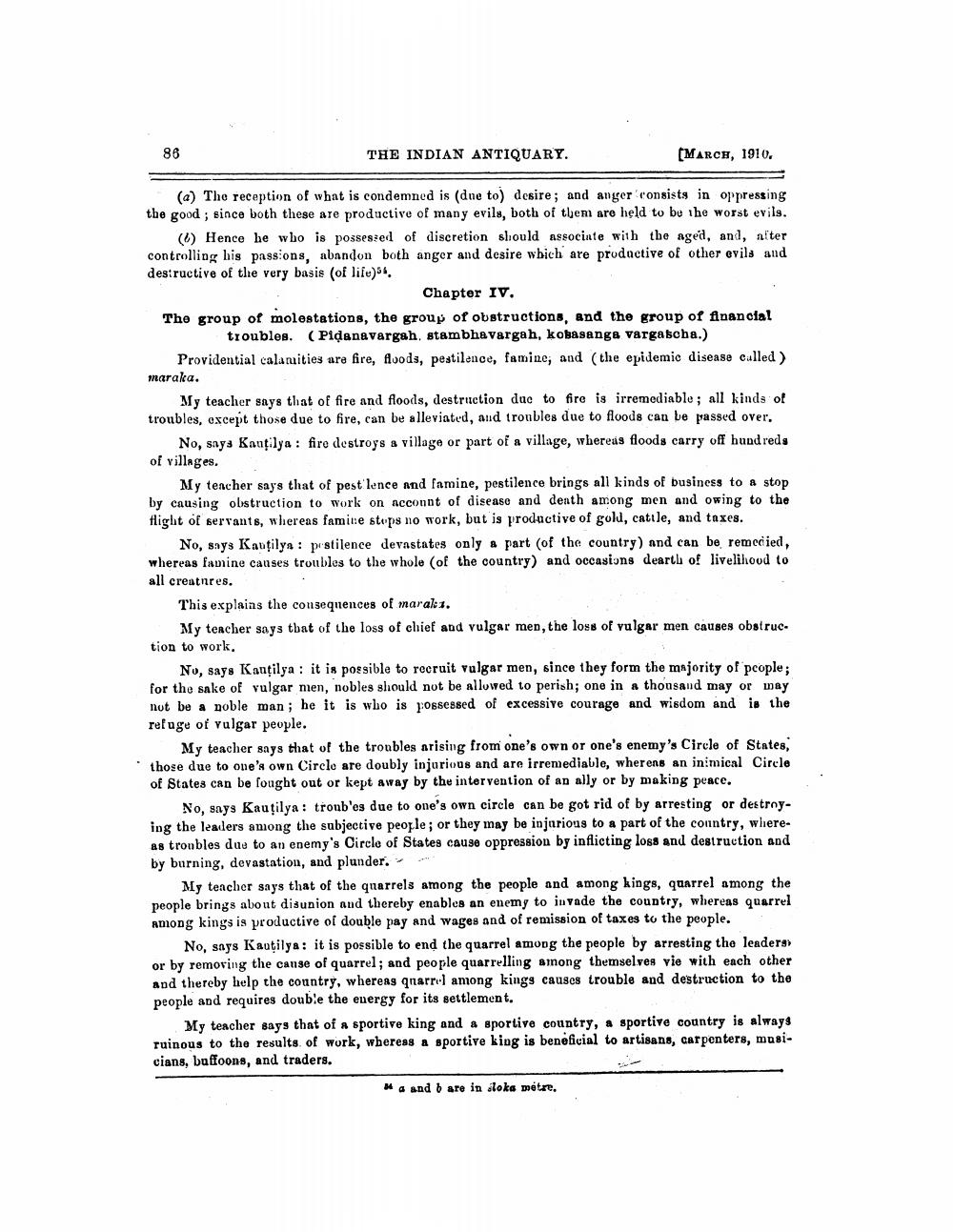________________
86
THE INDIAN ANTIQUARY.
(MARCH, 1910.
(a) The reception of what is condemned is (dne to) desire; and anger consists in oppressing the good ; since both these are productive of many evils, both of them are held to be the worst evils.
(6) Hence he who is possessed of discretion should associate with the aged, and, after controlling his passions, abandon both anger and desire which are productive of other evils and destructive of the very basis of life).
Chapter IV. The group of molestations, the group of obstructions, and the group of financial
troubles. (Pidanavargah, stambhavargah, kobasange vargabcha.) Providential calamities are fire, foods, pestilence, famine, and the epidemic disease called ) maraka.
My teacher says that of fire and floods, destruction due to fire is irremediable; all kinds of troubles, except those due to fire, can be alleviated, and troubles due to floods can be passed over,
No, says Kautilya: fire destroys a village or part of a village, whereas floods carry off hundreds of villages.
My tencher says that of pest'lence and famine, pestilence brings all kinds of business to a stop by causing obstruction to work on account of disease and denth among men and owing to the flight of servants, whereas famine stups no work, but is productive of gold, cattle, and taxes.
No, says Kautilya: prstilence devastates only a part of the country) and can be remedied, whereas famine causes troubles to the whole (of the country) and occasions dearth of livelihood to all creatnres.
This explains the consequences of marak 1.
My teacher says tbat of the loss of chief and vulgar men, the loss of vulgar men causes obstruc. tion to work.
No, says Kanţilya : it is possible to recruit valgar men, since they form the majority of people: for the sake of vulgar men, nobles should not be allowed to perish; one in a thousand may or may not be a noble man; he it is who is possessed of excessive courage and wisdom and is the refuge of vulgar people.
My teacher says that of the troubles arising from one's own or one's enemy's Circle of States, those due to one's own Circlo are doubly injurious and are irremediable, wherens an inimical Circle of States can be fought out or kept away by the intervention of an ally or by making peace.
No, says Kautilya: troubles due to one's own circle can be got rid of by arresting or destroying the leaders among the subjective people; or they may be injurious to a part of the country, whereas troubles due to an enemy's Circle of States cause oppression by inflicting loss and destruction and by burning, devastation, and plunder,
My teacher says that of the quarrels among the people and among kings, quarrel among the people brings about disunion and thereby enables an enemy to invade the country, whereas quarrel Among kings is productive of double pay and wages and of remission of taxes to the people.
No, says Kautilya: it is possible to end the quarrel among the people by arresting the leaders or by removing the canse of quarrel; and people quarrelling among themselves vie with each other and thereby help the country, whereas qnarri) among kings causes trouble and destruction to the people and requires double the energy for its settlement.
My teacher says that of a sportive king and a sportive country, a sportive country is always ruinous to the results of work, whereas a sportive king is beneficial to artisans, carpenters, musicians, baffoons, and traders.
Ma and b are in loka metre,




